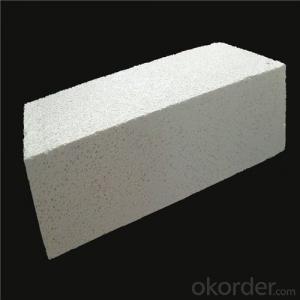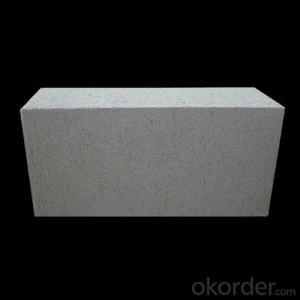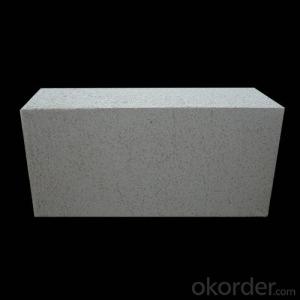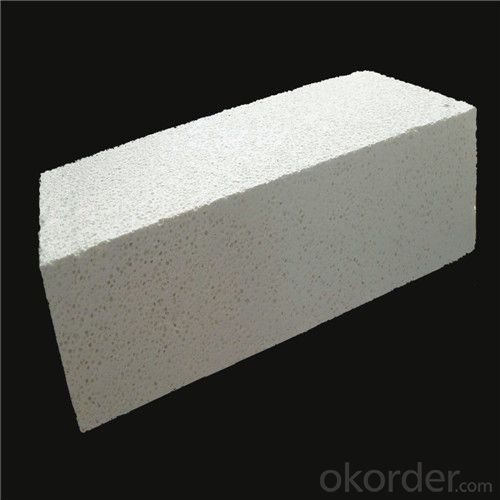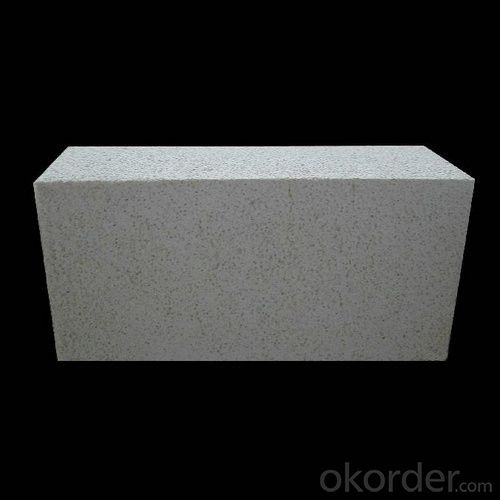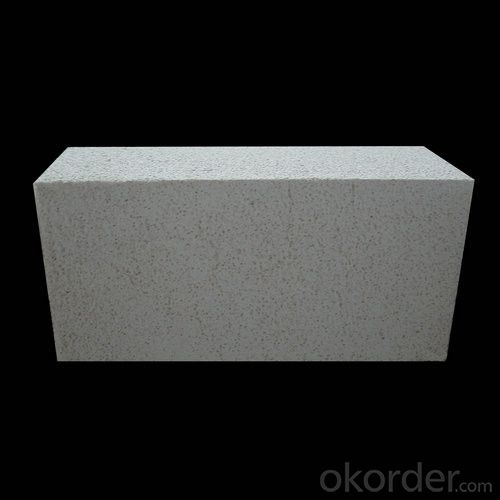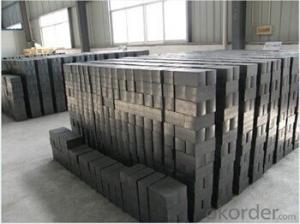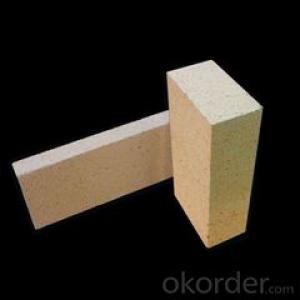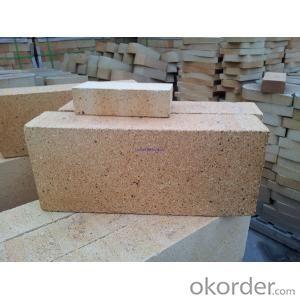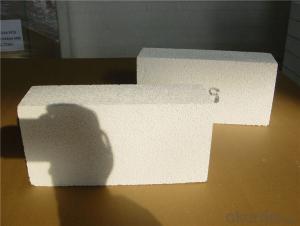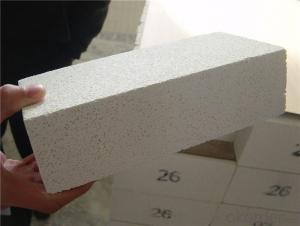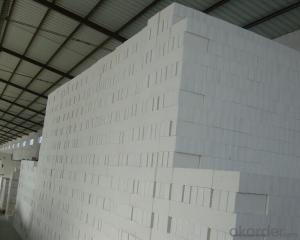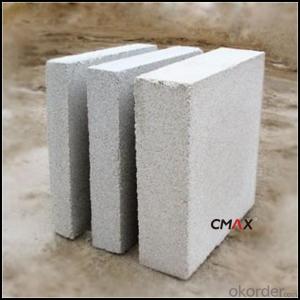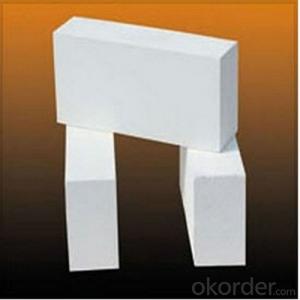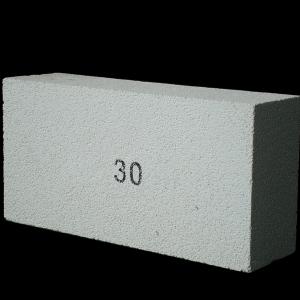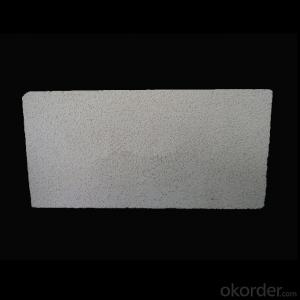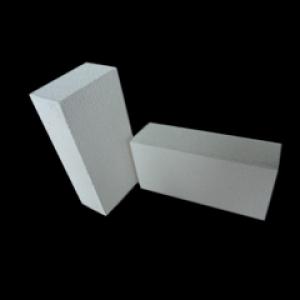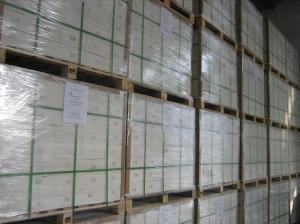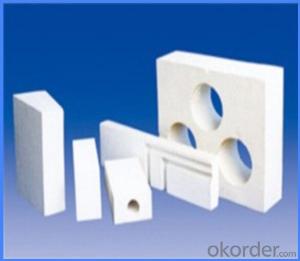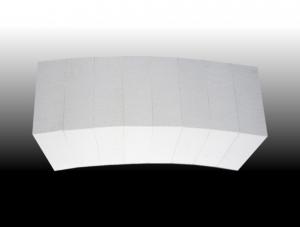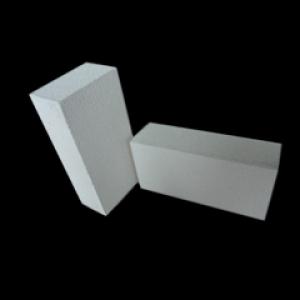High-Temperature Insulating Fire Brick for Fire Resistance
- Loading Port:
- Shanghai
- Payment Terms:
- TT OR LC
- Min Order Qty:
- 10 m.t.
- Supply Capability:
- 1000000 m.t./month
OKorder Service Pledge
OKorder Financial Service
You Might Also Like
nsulating Firebrick is made of high grade bauxite through high temperature calcinations. High alumina brick is a kind of neutral refractory material so that it enjoys excellent resistance
to acid and alkali corrosion. It has characteristic of high refractoriness under load, which decide high alumina brick is a n ideal material for various kinds of industrial furnace. It is widely
used in building lining of hot-blast stove, blast furnace, coke oven, rotary kilns of cement and so on.
characteristics: 1 Excellent thermal stability
2 High refractoriness under load
3 Chemical stability and anti-corrision
4 Small high temperature creep rate
5 Excellent thermal shock resistance
Typical Application: 1 Building materials for blast furnace
2 Building materials for hot-blast stove
3 Building materials for coke oven
4 Building materials for steel making furnace
5 Kiln car building
6 For ladle
Product Type: fireclay brick (SK 32, SK 34)
high alumina brick (sk 35-38)
Package: pallet, thermal shrinkage package
Technical Data
Item | Fireclay Brick | High Alumina Brick | |||||
SK32 | SK34 | SK35 | SK36 | SK37 | SK38 | ||
Al2O3 (%) ≥ | 38 | 42 | 48 | 55 | 65 | 75 | |
Refractoriness (oC) ≥ | 1670 | 1730 | 1750 | 1770 | 1790 | 1810 | |
Refractoriness under Load (oC) ≥ | 1250 | 1300 | 1420 | 1470 | 1500 | 1520 | |
Linear Change (%) (2h) | 1350 oC | 1350 oC | 1450 oC | 1500 oC | 1500 oC | 1500 oC | |
-0.5 | -0.5 | -0.4-+0.1 | -0.4-+0.1 | -0.4-+0.1 | -0.4-+0.1 | ||
Porosity (%) ≤ | 26 | 26 | 22 | 22 | 23 | 23 | |
Cold Crushing Strength, MPa ≥ | 15 | 20 | 39.2 | 44.1 | 49 | 53.9 | |
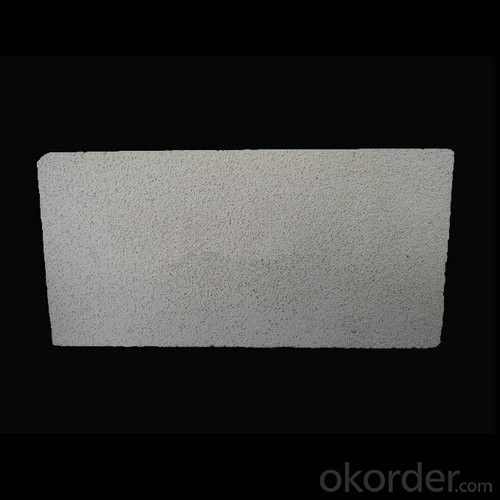
FAQ
Q1: How do you control the products quality?
A1: With strict quality control system throughout the materials selection and production process, our refractory and ceramic fiber products quality is effectively controlled to meet customer requirements.
From the raw materials selecting, our quality control begin. The quality certificates of raw materials are required and each batch will be tested before using. During production, the quality control are conducted by workers and then each piece will be sorted and examined by quality supervis
Q2: What`s the lead time for my order?
A2: It depends on customers’ requirements and our production schedule. And usually we need 30-60 days for refractory bricks,10-25 days for unshaped refractory materials and 10-20 days for ceramic fiber blankets.
Q3: Can you offer Door-to-Door delivery?
A3: Yes, but only for some countries such us U.S., UAE, Saudi Arabia, Iran, and Russia, etc.
Q4: What is the minimum quantity?
A4: There is no minimum order quantity. Depending on the item and processing, there may be a minimum production required, however we can offer a quotation based only on the quantity you need.
Q5: Can you give me a brief introduction of the application of your products?
A5: CNBM (China National Building Material) core refractory business comprises the production, sale and installation of high-grade refractory products, the development and implementation of customized system solutions as well as rendering outstanding services for the key industries in Glass, Iron& Steel, Petrochemical, Cement, Ceramic and Nonferrous Metals.
- Q: Can insulating fire bricks be used for insulation in incinerators?
- Yes, insulating fire bricks can be used for insulation in incinerators. These bricks are designed to withstand high temperatures and provide excellent thermal insulation, making them suitable for use in incinerators to minimize heat loss and improve energy efficiency.
- Q: Can insulating fire bricks be used in ceramic industry kilns?
- Yes, insulating fire bricks can be used in ceramic industry kilns. These bricks are designed to withstand high temperatures and provide excellent insulation, making them suitable for use in kilns where high heat retention and energy efficiency are important.
- Q: Can insulating fire bricks be used in the construction of glass melting furnaces?
- Insulating fire bricks are indeed applicable for constructing glass melting furnaces. These bricks are specifically designed to possess exceptional heat resistance and endure exceedingly high temperatures. Their low thermal conductivity allows for efficient heat retention and minimal heat loss. In glass melting furnaces, where temperatures can reach up to 1600°C (2912°F) or even higher, insulating fire bricks serve a pivotal role in maintaining the desired temperature within the furnace. By utilizing these bricks as the lining for the furnace, the heat generated during the melting process can be effectively contained, resulting in improved energy efficiency and reduced heat loss. Additionally, insulating fire bricks are lightweight and exhibit remarkable thermal shock resistance, making them highly suitable for glass melting furnaces that experience sudden temperature fluctuations. This ensures that the bricks will not crack or break under the extreme conditions present in the furnace. Overall, incorporating insulating fire bricks into the construction of glass melting furnaces offers superior insulation, energy efficiency, and durability, rendering them an ideal choice for this application.
- Q: What's the price of lightweight refractory bricks?
- In addition, general price comparisons are meaningless and need to be based on the use of demand = quality of products. After all, good quality is the driving force of continuous production.
- Q: Are insulating fire bricks resistant to alkali attack?
- Insulating fire bricks generally possess resistance to alkali attack. They are composed of high-temperature refractory materials and are engineered to endure extreme temperatures and chemical surroundings. Alkalis typically corrode and deteriorate certain substances, but insulating fire bricks are specifically devised to withstand this form of chemical assault. They possess limited porosity and a compact structure, thereby thwarting alkalis from infiltrating the brick's surface. Furthermore, the refractory materials employed in these bricks possess a high melting point and exhibit chemical inertness, rendering them ideal for situations where exposure to alkali is a concern. However, it is crucial to acknowledge that the resistance of insulating fire bricks to alkali attack may vary depending on the brick's composition, manufacturing process, as well as the concentration and duration of alkali exposure. Thus, it is always advisable to consult the manufacturer or supplier for comprehensive details regarding the alkali resistance of their specific insulating fire bricks.
- Q: Do insulating fire bricks have good insulation performance at high temperatures?
- Yes, insulating fire bricks have excellent insulation performance at high temperatures. These bricks are designed specifically to withstand extremely high temperatures and provide a high level of thermal insulation. They are made from lightweight materials that have low thermal conductivity, allowing them to effectively trap and contain heat within a furnace, kiln, or other high-temperature applications. This insulation property helps in reducing heat loss and maintaining a consistent temperature inside the structure. Insulating fire bricks are widely used in industries such as ceramics, metallurgy, glass-making, and heat treatment, where maintaining high temperatures and thermal efficiency are crucial.
- Q: Are insulating fire bricks resistant to alkali vapor attack?
- Yes, insulating fire bricks are generally resistant to alkali vapor attack. These bricks are made using high-quality refractory materials, such as fire clay or silica, which have excellent resistance to chemical attacks, including alkali vapor. They are designed to withstand high temperatures and harsh environments, making them suitable for applications where alkali vapor may be present, such as in industrial furnaces, kilns, and incinerators. However, the exact resistance may vary depending on the specific composition and manufacturing process of the insulating fire bricks. It is always recommended to consult the manufacturer's specifications or seek expert advice to ensure their compatibility with alkali vapor exposure.
- Q: Are insulating fire bricks suitable for applications with high mechanical stress?
- No, insulating fire bricks are not suitable for applications with high mechanical stress. They are designed to provide thermal insulation rather than mechanical strength, so they may crack or break under high mechanical stress.
- Q: Can insulating fire bricks be used in the construction of heat recovery systems?
- Yes, insulating fire bricks can be used in the construction of heat recovery systems. Insulating fire bricks are designed to withstand high temperatures and provide excellent thermal insulation, making them an ideal choice for heat recovery systems. These bricks are made from lightweight materials, such as ceramic fibers or refractory materials, which have low thermal conductivity. This property allows them to effectively trap and retain heat, preventing it from escaping the system and maximizing energy efficiency. Additionally, insulating fire bricks are resistant to thermal shock, meaning they can withstand rapid temperature changes without cracking or breaking. This makes them suitable for the varying heat conditions often found in heat recovery systems. Overall, using insulating fire bricks in the construction of heat recovery systems can help improve their performance and efficiency by minimizing heat loss and optimizing energy recovery.
- Q: Can insulating fire bricks be used for insulation in chemical storage tanks?
- Yes, insulating fire bricks can be used for insulation in chemical storage tanks. Insulating fire bricks are specifically designed to provide high levels of thermal insulation, making them suitable for various industrial applications, including chemical storage tanks. These bricks have excellent insulating properties due to their low thermal conductivity, which helps to minimize heat transfer and maintain a stable temperature inside the tank. Additionally, insulating fire bricks are resistant to high temperatures and can withstand the corrosive nature of many chemicals, making them a suitable choice for insulating chemical storage tanks.
Send your message to us
High-Temperature Insulating Fire Brick for Fire Resistance
- Loading Port:
- Shanghai
- Payment Terms:
- TT OR LC
- Min Order Qty:
- 10 m.t.
- Supply Capability:
- 1000000 m.t./month
OKorder Service Pledge
OKorder Financial Service
Similar products
Hot products
Hot Searches
Related keywords
